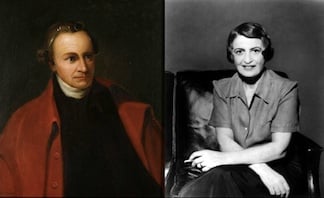 From tea partyers to conservatives to “liberals” to flea partyers—everyone has an opinion about what people and governments have a right to.
From tea partyers to conservatives to “liberals” to flea partyers—everyone has an opinion about what people and governments have a right to.
“People have a right to keep what they earn”—“The government has a right to spread the wealth around”—“Women have a right to abortion”—“No they don’t”—“People have a right to an education, a job, a home, and health care”—“The government has a right to regulate corporate greed”—“The government has no right to interfere in the economy”—“The 99 percent has a right to the wealth of the 1 percent”—and so on. In some form or another, we hear such opinions daily.
But are anyone’s opinions on such matters more than mere opinions? Can anyone name the source and nature of rights and prove that his views are true?
Some say that rights are gifts from God. Others rightly reply: Prove it. Some claim that rights are grants from government. Others note that this contradicts the very idea of rights. Some claim that rights are matters of “natural law.” Others aptly ask: How so? What natural law? Natural law emanating from God? Wouldn’t that be “supernatural law”?
Although everyone has an opinion about rights, almost no one can prove that his opinion is correct. For advocates of liberty, this is a big problem. If we can’t identify the objective source and nature of rights, we can’t defend freedom; we can’t reverse the statist trend that is destroying our world; we will lose our liberty.
Fortunately, Ayn Rand discovered the objective source and nature of rights, and anyone who wants to understand these vital truths can—in the course of about half an hour.
In my article "Ayn Rand’s Theory of Rights: The Moral Foundation of a Free Society," I examine the traditional theories of rights—God-given, government-granted, and “natural” rights—and show why none of these theories holds water. I then present Rand’s theory, showing step by step how it is derived from perceptual reality, why it is demonstrably true, and how it grounds the propriety of freedom in observable fact.
Rand’s ideas are radical. They go to philosophical roots and challenge the Judeo-Christian worldview to its core. But true advocates of liberty are not averse to radical ideas. True advocates of liberty know that America was founded on radical ideas. True advocates of liberty are willing to examine arguments in support of freedom and to embrace even the most radical ideas when such ideas are grounded in evidence and logic.
From Sarbanes-Oxley to Obamacare to Dodd-Frank to TSA molestations to countless coercive “stimulus” plans, we are losing our liberty. What will our political situation be in five, ten, fifteen years? Will we be free, semi-free, mostly controlled, or essentially enslaved?
It depends on what we are willing to do today.
Are we willing to consider radical ideas and evidence in support of them—even if they challenge the status quo? Are we willing to share with others the truths we discover—even if doing so makes us look radical? Or are we afraid of evidence that might contradict traditional views, afraid that knowing too much unpopular truth might entail too much mental and social fatigue.
“For my part,” said Patrick Henry, “whatever anguish of spirit it may cost, I am willing to know the whole truth.” When enough people approach Rand’s ideas with Henry’s courage, liberty will live again.
Related:
- Ayn Rand's Theory of Rights: The Moral Foundation of a Free Society
- Atlas Shrugged and Ayn Rand’s Morality of Egoism
- Economics in Atlas Shrugged
Image of Patrick Henry: Wikipedia Commons
Image of Ayn Rand: Wikipedia Commons


![[TEST] The Objective Standard](https://test.theobjectivestandard.com/wp-content/uploads/2017/10/logo.png)











